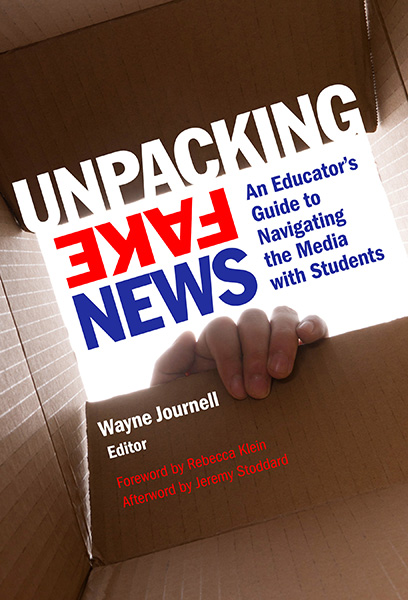Professors: Request an Exam Copy
Print copies available for US orders only. For orders outside the US, see our international distributors.
Edited by: Wayne Journell
Foreword by: Rebecca Klein
Afterword by: Jeremy Stoddard
Publication Date: March 8, 2019
Pages: 176

Since the 2016 presidential election, the term fake news has become part of the national discourse. Although some have appropriated the term for political purposes, actual fake news represents an inherent threat to American democracy given the ease through which it is consumed and shared via social media. This book is one of the first of its kind to address the implications of fake news for the K–12 classroom. It explores what fake news is, why students are susceptible to believing it, and how they can learn to identify it. Leading civic education scholars use a psychoanalytic lens to unpack why fake news is effective and to show educators how they can teach their students to be critical consumers of the political media they encounter. The authors also link these ideas to the broader task of civic education and critical engagement in the democratic process.
Book Features:
Wayne Journell is associate professor and secondary education program coordinator at the University of North Carolina at Greensboro. He currently serves as editor of Theory & Research in Social Education and is a past recipient of the Exemplary Research in Social Studies Award from the National Council for the Social Studies (NCSS).
“Timely, provocative, and eminently readable…Journell realized that he could bring important perspectives together in one place, and the result is this book. As a knowledgeable reader, I have had the opportunity to analyze, criticize, and admire what he and his collaborators have produced. Whether a novice or an expert, you too are likely to be stimulated by what this book offers.”
—Teachers College Record
“Inside this book you will find a thorough explanation of what 'fake news' is, how it became such a phenomenon, and why we are so susceptible to believing it. You will find descriptions of simple lessons practiced by experts that can help make students more critical news consumers. You will hear from a variety of perspectives, some of which are sadly still too often overlooked in mainstream narratives. You may even learn that you have not been reading news with the most judicious eye.” —From the foreword by Rebecca Klein, HuffPost
“While ‘fake news’ is not new and often not really news, this engaging collection of insightful essays makes the case quite clearly that its impact on democracy is likely more serious now than it has been in the past. Not shying away from the important ‘what should we do now’ question, one of the notable strengths of this book is its emphasis on concrete approaches with the potential to help students develop the critical eye and specific skills needed to protect themselves and the larger democracy from the insidious influence of fake news.”
—Diana Hess, professor and dean of the School of Education, University of Wisconsin–Madison
“This book is both an important contribution to social studies education and a timely response to the demands of our current political moment. Educators have always faced the challenge of helping young people make sense of social issues amidst a swirl of sometimes superficial, contradictory, or misleading information. In this volume, we learn what is distinctive about today’s problem of ‘fake news’ and how it affects young people inside and outside of schools. The authors also offer educators promising ways of thinking and acting to help students forge an active and empowered relationship to news and knowledge about public life.”
—John Rogers, professor and director of UCLA’s Institute for Democracy, Education, and Access
“Fake news is a critical problem for our society, and especially for educators who teach civics. The authors of this important book use rigorous empirical evidence, real-world experience, and thoughtful arguments to propose a range of solutions that civic educators—and all citizens—should consider.”
—Peter Levine, associate dean, Jonathan M. Tisch College of Civic Life, Tufts University
“A much-needed set of analyses, offering multiple perspectives on the problem, and loaded with insights.”
—Walter Parker, professor, University of Washington
Contents
Foreword by Rebecca Klein
Preface
Introduction: Fake News and the Imperative of Civic Education
Wayne Journell
Chapter 1. Why Does Fake News Work? On the Psychosocial Dynamics of Learning, Belief, and Citizenship
H. James Garrett
Chapter 2. Real Recognize Real: Thoughts on Race, Fake News, and Naming Our Truths
Ashley N. Woodson, LaGarrett J. King, and Esther Kim
Chapter 3. Teens, Social Media, and Fake News
Ellen Middaugh
Chapter 4. How Students Evaluate Digital News Sources
Sarah McGrew, Joel Breakstone, Teresa Ortega, Mark Smith, and Sam Wineburg
Chapter 5. Teaching in the Twilight Zone of Misinformation, Disinformation, Alternative Facts, and Fake News
Avner Segall, Margaret Smith Crocco, Anne-Lise Halvorsen, and Rebecca Jacobsen
Chapter 6. Judging Credibility in Un-Credible Times: Three Educational Approaches for the Digital Age
Erica Hodgin and Joseph Kahne
Chapter 7. Political Memes and the Limits of Media Literacy
Wayne Journell and Christopher H. Clark
Chapter 8. Two Truths and Fake News: Lessons for Young Learners
Jennifer Hauver
Afterword by Jeremy Stoddard
About the Editor and Contributors
Index
Wayne Journell, Winner of the 2018 NCSS Exemplary Research Award
Professors: Request an Exam Copy
Print copies available for US orders only. For orders outside the US, see our international distributors.